|
|
|
Sort Order |
|
|
|
Items / Page
|
|
|
|
|
|
|
| Srl | Item |
| 1 |
ID:
131619
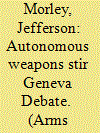

|
|
|
|
|
| Publication |
2014.
|
| Summary/Abstract |
The first multinational conference dedicated exclusively to robotic warfare took place May 13-16 at the UN Office at Geneva as governments around the world confront the emerging technologies that policymakers call "lethal autonomous weapons systems" and headline writers have dubbed "killer robots." The three-day meeting featured diplomats, scholars, and activists debating the implications of new weapons that could automatically target and kill people without human control. Although few such weapons exist now, revolutionary developments in sensors and robotics have stoked fears in some quarters that these weapons systems could make warfare less risky for the attacker and therefore more indiscriminate, but raised hopes in others that they might reduce civilian casualties.
|
|
|
|
|
|
|
|
|
|
|
|
|
|
|
|
| 2 |
ID:
129104
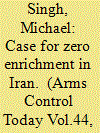

|
|
|
|
|
| Publication |
2014.
|
| Summary/Abstract |
In the debate over sanctions on Iran-their role in bringing Tehran to the negotiating table and their proper place in U.S. diplomatic strategy in the future-scant attention has been paid to a major shift in the negotiating position of the P5+1, the group of six countries (China, France, Germany, Russia, the United Kingdom, and the United States) that is negotiating with Tehran over the Iranian nuclear program. No longer is the P5+1 demanding that Iran halt uranium enrichment. Indeed, in the November 24 first-step nuclear accord, the Joint Plan of Action,[1] the P5+1 all but concedes that Iran will be permitted to enrich in perpetuity. In separate comments that have quickly become conventional wisdom among Iran analysts, U.S. negotiators now characterize their previous position that Iran should halt enrichment as "maximalist."[2] Although undoubtedly expedient, this shift away from a zero-enrichment negotiating position is misguided and unnecessary.[3] The U.S. shift away from zero enrichment to limited enrichment represents a significant diplomatic victory for Iran. For the last decade, the position of the EU-3 (France, Germany, and the UK) and then the P5+1 had been that Iran must "suspend all enrichment-related and reprocessing activities, including research and development." This position was enshrined as an Iranian obligation in a series of UN Security Council resolutions.[4] Iran, however, asserted a "right to enrich" and refused to halt enrichment after resuming it when nuclear talks with the European Union broke down in 2005. This difference formed the core of the confrontation that subsequently developed between Iran and the allies.
|
|
|
|
|
|
|
|
|
|
|
|
|
|
|
|
| 3 |
ID:
128071
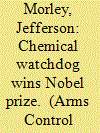

|
|
|
|
|
| Publication |
2013.
|
| Summary/Abstract |
The Organisation for the Prohibition of Chemical Weapons (OPCW) was awarded the Nobel Peace Prize on Oct. 11 for its efforts in eliminating the scourge of chemical warfare.
The honor boosted the Hague-based organization just 10 days after its personnel arrived in Syria on the most challenging mission of its 16-year history: dismantling the chemical arsenal of President Bashar al-Assad's besieged government.
In an Oct. 11 statement to the press, OPCW Director-General Ahmet Üzümcü, a former Turkish diplomat, said the OPCW operates "away from the glare of international publicity" while taking on the "onerous but noble task" of implementing the Chemical Weapons Convention, which took effect in 1997.
|
|
|
|
|
|
|
|
|
|
|
|
|
|
|
|
| 4 |
ID:
131617
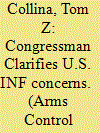

|
|
|
|
|
| Publication |
2014.
|
| Summary/Abstract |
A U.S. congressman provided new details in late April about the Obama administration's allegation that Russia may be breaching a key U.S.-Russian arms control treaty, stating that Moscow may have tested a cruise missile from a prohibited launcher. At a joint April 29 hearing of two House Foreign Affairs Committee panels, Rep. Brad Sherman (D-Calif.) said that Russia claims to have tested an intermediate-range missile for use at sea, which is allowed under the 1987 Intermediate-Range Nuclear Forces (INF) Treaty, but that Moscow used "what appears to be an operational, usable ground-based launcher," which is not allowed. Sherman said that "it appears as if [the Russians] were developing a ground-based capacity for this intermediate missile.
|
|
|
|
|
|
|
|
|
|
|
|
|
|
|
|
| 5 |
ID:
128097
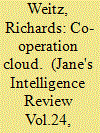

|
|
|
|
|
| Publication |
2012.
|
| Summary/Abstract |
Russia's announcement that it does not want to renew the co-operative threat reducing programme with the United States has raised questions about the bilateral relationship. Richard Weitz investigates what it means for future agreements.
|
|
|
|
|
|
|
|
|
|
|
|
|
|
|
|
| 6 |
ID:
129103
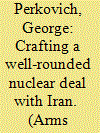

|
|
|
|
|
| Publication |
2014.
|
| Summary/Abstract |
A final nuclear deal with Iran should meet the underlying objective of the relevant UN Security Council resolutions since 2006: "the establishment of international confidence in the exclusively peaceful nature of Iran's nuclear programme."A final agreement could be codified and endorsed through a new resolution, which need not include all of the specific instrumental elements of past resolutions-for example, suspension of all uranium enrichment-if the council determines that the overall objective has been met. As the resolutions acknowledge, to be durable, such an agreement also must satisfy Iran's interest in having a purely peaceful nuclear program free from sanctions. The devilish challenge will be in the details. History will inform each party's requirements. The six-country group that has been negotiating with Iran, the so-called P5+1 (China, France, Germany, Russia, the United Kingdom, and the United States), will remember that Iran secretly had, at least until 2003, what appeared to be a dedicated, multifaceted program to acquire capabilities to produce nuclear weapons. Iran still has not cooperated fully with the International Atomic Energy Agency (IAEA) to clarify these activities and continues to expand sensitive fuel-cycle capabilities beyond any plausible civilian requirement. Iranian leaders, for their part, remember numerous episodes that reflect a U.S. determination to hasten an end to their regime.
|
|
|
|
|
|
|
|
|
|
|
|
|
|
|
|
| 7 |
ID:
128139
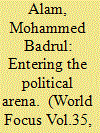

|
|
|
|
|
| Publication |
2014.
|
| Summary/Abstract |
The Indian community in United States is one among many ethnic communities, which have been increasingly visible in the last four decades. Although the flow of Indians as new ethnic started first as a trickle in 1895, their impact was really felt in the aftermath of the landmark 1965 immigration legislation. This new immigration groups has begun to attract academic attention and has to been the focus of research by a number of scholars.
|
|
|
|
|
|
|
|
|
|
|
|
|
|
|
|
| 8 |
ID:
128138
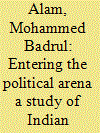

|
|
|
|
|
| Publication |
2014.
|
| Summary/Abstract |
The Indian community in United States is one among many ethnic communities, which have been increasingly visible in the last four decades. Although the flow of Indians as new ethnic started first as a trickle in 1895, their impact was really felt in the aftermath of the landmark 1965 immigration legislation. This new immigration groups has begun to attract academic attention and has to been the focus of research by a number of scholars.
|
|
|
|
|
|
|
|
|
|
|
|
|
|
|
|
| 9 |
ID:
127854
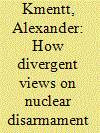

|
|
|
|
|
| Publication |
2013.
|
| Summary/Abstract |
The nuclear Nonproliferation Treaty (NPT) is facing several serious challenges. There are increasing doubts about its effectiveness in preventing the proliferation of nuclear weapons. The actions of North Korea are deeply worrying and significantly undermine the NPT edifice. The complex issue of the Iranian nuclear program and if and how it can be resolved will have serious repercussions for the treaty.
Universality is a key ingredient of the NPT's credibility, but looks more and more distant. Without India, Israel, and Pakistan, which never were parties, and North Korea, which declared its withdrawal from the treaty in 2003, the NPT's value as a security and confidence-building instrument is increasingly put into question in the regional contexts of the Middle East and Asia. Arguably its most serious challenge, however, is the extent to which it can still be considered as a framework in which to achieve nuclear disarmament. Fundamentally different and even conflicting views are apparent among the NPT membership on key aspects, such as the priority of nuclear disarmament, the demands of Article VI,[1] the definition of credible progress, and the way forward. These differences threaten the integrity of the NPT.
|
|
|
|
|
|
|
|
|
|
|
|
|
|
|
|
| 10 |
ID:
128059
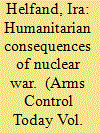

|
|
|
|
|
| Publication |
2013.
|
| Summary/Abstract |
In March, 130 nations gathered in Oslo for a two-day conference on the humanitarian consequences of nuclear war. The five countries that the nuclear Nonproliferation Treaty (NPT) recognizes as nuclear-weapon states staged a coordinated boycott, arguing that a meeting that discussed what will actually happen if nuclear weapons are used would somehow distract them from the important initiatives they are pursuing to lower the number of nuclear weapons that they possess. Next February, there will be a follow-up conference in Mexico to further delineate the medical effects of nuclear war as they are now understood and to consider the circumstances under which nuclear war might occur. Far from being a distraction, these meetings are helping to create the conditions necessary for the elimination of nuclear weapons. The United States and the four other NPT nuclear-weapon states should participate in the Mexico conference and actively promote the process launched in Oslo to educate policymakers and the general public about the catastrophic humanitarian consequences of nuclear war. This task is particularly urgent in view of the new data that have emerged over the last few years. This information indicates that even a very limited nuclear war, confined to one region of the globe, would have devastating effects worldwide.
|
|
|
|
|
|
|
|
|
|
|
|
|
|
|
|
| 11 |
ID:
128082
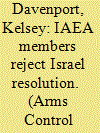

|
|
|
|
|
| Publication |
2013.
|
| Summary/Abstract |
A resolution critical of Israel's nuclear program, revived after a two-year hiatus, failed to pass the General Conference of the International Atomic Energy Agency (IAEA) last month. The nonbinding resolution, sponsored by a group of 18 Arab states, would have called on Israel to join the nuclear Nonproliferation Treaty (NPT) as a non-nuclear-weapon state and put all of its nuclear sites under comprehensive IAEA safeguards. The measure, referred to as "Israeli Nuclear Capabilities" on the IAEA agenda, failed by a vote of 43-51 on Sept. 20, the last day of the conference.
|
|
|
|
|
|
|
|
|
|
|
|
|
|
|
|
| 12 |
ID:
128084
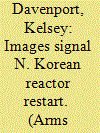

|
|
|
|
|
| Publication |
2013.
|
| Summary/Abstract |
Satellite images indicate that North Korea is restarting a nuclear reactor that could produce plutonium for nuclear weapons in the future, analysts say, but one of the analysts estimates it will be about 18 months before Pyongyang will have more plutonium available for weapons.
In a Sept. 11 piece published by 38 North, a website run by the U.S.-Korea Institute at Johns Hopkins University, Nick Hansen and Jeffery Lewis concluded that satellite images from Aug. 31 showed steam coming from a building near the reactor that was consistent in "coloration and volume" with bringing the reactor's electrical generating systems online. The reactor is "in or nearing operation," said Hansen, a former military imagery analyst, and Lewis, the director of the East Asia Nonproliferation Program at the James Martin Center for Nonproliferation Studies.
|
|
|
|
|
|
|
|
|
|
|
|
|
|
|
|
| 13 |
ID:
128081
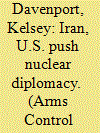

|
|
|
|
|
| Publication |
2013.
|
| Summary/Abstract |
Following a high-level series of diplomatic exchanges and meetings between U.S. and Iranian leaders in late September, both sides say there is a strong basis for a diplomatic resolution to the long-running impasse over Iran's nuclear program. In the highest level of contact between the two governments since 1979, President Barack Obama and Iranian President Hassan Rouhani spoke by telephone about Iran's nuclear program Sept. 27, Obama told reporters at a White House news conference later that day. "While there will surely be important obstacles" and success is not guaranteed, "I believe we can reach a comprehensive solution" to the dispute over Tehran's nuclear program, Obama said.
|
|
|
|
|
|
|
|
|
|
|
|
|
|
|
|
| 14 |
ID:
131615
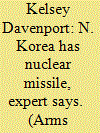

|
|
|
|
|
| Publication |
2014.
|
| Summary/Abstract |
North Korea probably can make nuclear warheads that are small enough to fit on its ballistic missiles, and activities at its nuclear test site and satellite launch facility likely indicate that Pyongyang is planning further tests to continue improving its nuclear arsenal, a former South Korean official said last month.
In a May 19 interview, the former official said that Pyongyang can "likely fit a nuclear warhead on a Rodong missile" although it is not certain that the warhead would detonate properly.
The medium-range Rodong missile, also known as the Nodong, is a deployed system with a range of 1,300 kilometers. This places South Korea, Japan, and parts of China within its range.
Experts have expressed skepticism in the past about North Korea's ability to deliver a nuclear warhead via a missile, but that sentiment apparently is beginning to shift.
|
|
|
|
|
|
|
|
|
|
|
|
|
|
|
|
| 15 |
ID:
131023
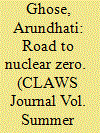

|
|
|
|
|
| Publication |
2014.
|
| Summary/Abstract |
India-Japan relations are an important in?exion point, where we have, earlier, rarely had the opportunity of exchanging views on matters of strategic importance to both our countries, particularly in the areas of
nuclear disarmament, nuclear non-proliferation and nuclear weapons in general. Both India and Japan face threats of a nuclear nature, both overt and latent, yet have been at the forefront of supporting the cause of a world free of nuclear weapons. India is a nuclear-armed state, faces two nuclear armed neighbours with whom it has, if not hostile, at the least, adversarial relations, including territorial disagreements, while Japan, which is protected by a nuclear umbrella, also faces dangers from two nuclear armed neighbours. Yet, both countries appear to remain staunch in their support of Nuclear Zer0-the complete elimination of nuclear weapons. Both countries have often sponsored resolutions in the UN calling for nuclear disarmament, but, unfortunately, almost always, separately.
|
|
|
|
|
|
|
|
|
|
|
|
|
|
|
|
| 16 |
ID:
130333
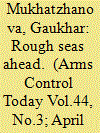

|
|
|
|
|
| Publication |
2014.
|
| Summary/Abstract |
From April 28 to May 9, states-parties to the nuclear Nonproliferation Treaty (NPT) will gather in New York for the third and final meeting of the Preparatory Committee for the 2015 NPT Review Conference.[1] Although it is unlikely that states will try to negotiate substantive recommendations for the review conference, the preparatory meeting is still an opportunity to take stock of developments and assess the condition of the regime as the treaty approaches the 45th anniversary of its entry into force.
More than a year away, the 2015 review conference is promising to be highly contentious, with the Middle East and nuclear disarmament at the center of tensions among the parties and progress on both issues viewed as a test of the treaty's credibility. The rapidly evolving initiative centered on the humanitarian impact of nuclear weapons is reshaping the traditional NPT debate, challenging the incremental approach to disarmament. The events unfolding in Ukraine may yet have a serious impact, reaffirming the belief among some that nuclear weapons or protection of a nuclear alliance are necessary for national security and further diminishing the possibility of any progress on disarmament. On the other hand, the crisis might help re-energize the discourse on the risks of escalation and use of nuclear weapons.
|
|
|
|
|
|
|
|
|
|
|
|
|
|
|
|
| 17 |
ID:
131618


|
|
|
|
|
| Publication |
2014.
|
| Summary/Abstract |
Meeting for the final time before their review conference next spring, parties to the nuclear Nonproliferation Treaty (NPT) gathered for two weeks at the United Nations, but were unable to adopt a common set of recommendations. This outcome could serve as a preview for the 2015 review conference, where disagreements are expected about the pace of nuclear disarmament efforts.
Enrique Román-Morey of Peru, who chaired the April 28-May 9 preparatory meeting, was unable to bridge differences and produce a consensus report on recommendations for the 2015 conference. At a May 9 press conference after the meeting ended, Román-Morey said agreement was not possible because there was not enough time to resolve key issues, such as the pace of disarmament by the nuclear-weapon states and the establishment of a Middle Eastern zone free of weapons of mass destruction.
|
|
|
|
|
|
|
|
|
|
|
|
|
|
|
|
| 18 |
ID:
130372
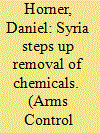

|
|
|
|
|
| Publication |
2014.
|
| Summary/Abstract |
Syria has picked up the pace in removing its chemical weapons materials for overseas destruction and has sent about half of its stockpile out of the country, according to figures in a March 20 press release from the Organisation for the Prohibition of Chemical Weapons (OPCW). Syria had been under broad international pressure to speed up the effort. By the end of February, it had made four shipments, removing about 5 percent of its so-called Priority 1 chemicals and about 20 percent of the Priority 2 chemicals. Citing those figures, Robert Mikulak, the U.S. ambassador to the OPCW, had accused Syria of "continu[ing] to drag its feet." (See ACT, March 2014.) Under a schedule set last November by the OPCW Executive Council, the Priority 1 materials were supposed to leave the country by Dec. 31. All other materials that are part of the overseas destruction program were to leave by Feb. 5. The rest of the approximately 1,300 metric tons of chemical agents that Syria declared is to be destroyed within the country. The removal dates were set with an eye to a June 30 deadline for destruction of the chemical agents, which was established last September by the Executive Council and the UN Security Council. (See ACT, October 2013.)
|
|
|
|
|
|
|
|
|
|
|
|
|
|
|
|
| 19 |
ID:
127863


|
|
|
|
|
| Publication |
2013.
|
| Summary/Abstract |
In a sign of rising frustration among states without nuclear weapons at the slow pace of disarmament efforts, the UN's disarmament committee in New York passed a resolution in November with the support of 129 states calling for the "urgent" start of multilateral negotiations to eliminate nuclear weapons and designating Sept. 26 as the international day for their "total elimination." "Our delegations joined the call of the overwhelming majority of states for more urgency, focus, and new momentum for nuclear disarmament," Ireland's representative said after the Nov. 4 vote, also speaking on behalf of Austria, Liechtenstein, Malta, New Zealand, and San Marino.
|
|
|
|
|
|
|
|
|
|
|
|
|
|
|
|
| 20 |
ID:
128262


|
|
|
|
|
| Publication |
2013.
|
| Summary/Abstract |
In the two and a half years since the March 11, 2011 earthquake and tsunami disaster followed by the nuclear accident at Fukushima power plant, the Japanese government has been investigating the cause as well as assessing the responses taken as disaster management. This article analyzes the measures taken and makes recommendations for clarifying responsibility to improve efficiency and effectiveness in mitigating damage after a large-scale disaster.
It is highly regrettable that, although the result of a massive earthquake and tsunami of an unprecedented scale, the accident at the Fukushima nuclear power plant developed into a core meltdown, releasing nuclear material and forcing many residents to evacuate their homes. The crisis has undermined public faith in the safety of nuclear power generation. The Japanese government and Tokyo Electric Power Company (TEPCO) must conduct a thorough investigation into the cause, and review and assess the validity of the existing emergency response procedures as well as the relevancy of the measures actually taken for resident evacuation and radiation damage control in collaboration with the International Atomic Energy Agency (IAEA) and other international and government agencies. Sharing the results internationally will help improve nuclear safety around the world.
The biggest problem surrounding the accident was the intricate chain of command and control for disaster management. Since the authority and responsibility of the agencies concerned were extremely ambiguous, the government was unable to make good use of the systems and institutions designed to cope with nuclear disasters. To make matters worse, newly created posts and entities complicated the problem.
|
|
|
|
|
|
|
|
|
|
|
|
|
|
|
|
|
|
|
|
|